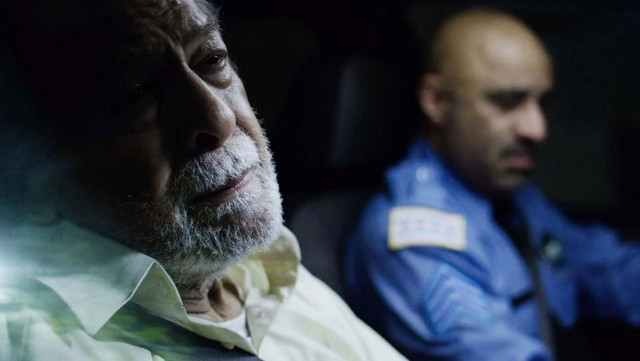Qavi Khan's film, 'I'll Meet You There' banned in Pakistan
Censor Board claims film does not reflect true Pakistani culture, portrays a negative image of Muslims

Iron Man famed Pakistani-British star Farhan Tahir was all set to star in a Pakistani project with veteran actor Qavi Khan. The duo, alongside Nikita Tewani, Sheetal Sheth, Shawn Parsons, Andrea Cirie, Nitin Madan, Michael Pemberton, Samrat Chakrabarti and Rachit Trehan, were gearing up for the domestic release of I'll Meet You There.
The film, which was released internationally in 2021, was all set for a theatrical release in Pakistan. However, the film has now been banned by the Central Board of Film Censors, Variety initially reported. Helmed by award-winning director Iram Parveen Bilal, the film is said to be a "modern and moving portrait of three generations of a Muslim-American family. I'll Meet You There follows Majeed, a Chicago policeman, and his teenage daughter Dua, a gifted ballerina, who are unexpectedly visited by Baba, Majeed’s long-estranged father from Pakistan.
According to Variety, "The CBFC found the film unsuitable for public exhibition on the grounds that it does not reflect true Pakistani culture, portrays a negative image of Muslims and is against the social and cultural values of Pakistan. The CBFC has refused to grant a censorship certificate on these grounds."
Speaking to The Express Tribune, a senior official at CBFC confirmed that the film has been banned in Pakistan. "I'll Meet You There was reviewed by the full board of CBFC and after watching it was decided that the film is not suitable to be given NOC for a release in the country. There were several controversial topics and details that opposed our policy. The board unanimously agreed on a ban," a senior official shared with us.
While the film was banned by CBFC, I'll Meet You There has not been reviewed by Punjab Film and Censor Board, according to an official. The Punjab Board was awaiting to review the film but after it was banned by CBFC, they snubbed the board meeting for the film's review.
Bilal lamented on CBFC's decision to ban the film. “I’ve been mulling over the decision by the Central Board of Film Censors, calling our film I’ll Meet You There a ‘negative image of Muslims.’ A film that was made with blood, sweat and tears by a Muslim, financed by Muslims and made in the face of a post 9/11 world and a Trump presidency; a film whose very purpose was to combat Islamophobia and to create a positive portrayal of Muslims. A film already released abroad and celebrated widely by the Muslim Pakistani diaspora and seen as a needed and humanised representation of our people. How could that intention be reframed so oppositely and so negatively?" she told Variety.
She went on to add, “I feel the answer lies in the direction of the belief that ‘Muslims’ and ‘Pakistanis’ are not a monolith, that they are a living, breathing, agreeing, the disagreeing body of people who happen to identify with the same faith and/or nationality. So, then who really gets to decide what an aligned or misaligned value system is when the value system itself is not a single presentation but a spectrum of values; of erring human beings, growing and adjusting to life and its complex challenges, one day at a time."
The filmmaker continued that she "respectfully disagree that there is just one notion of what Pakistan and Pakistani values are. When we ask the diaspora to contribute and donate when we even care to enable them to vote in elections, then we should also include their troubles, identity struggles and issues as ‘Pakistani.’ Let’s please end the elitism that a nation or religion can only belong to a select few."
She went on to comment, "Such fearful silencing is not the way forward for a country that is vibrantly developing in population, promise and identity. We as artists have a responsibility to showcase and provoke thought, to inspire and engage with a society that is equally provoking and expanding."
Tahir also weighed in on the matter. The actor said, “It is disheartening, disappointing and shameful that issues that Pakistani ex-pats face in their lives are trivialized and labeled as ‘not reflecting true Pakistani culture.’ We, Pakistanis, represent our country with love and pride every day while living in foreign lands. We do this to support our families and loved ones. We do this to support our country financially and in every other way. We do this with nothing but love for our country and yet to be cast aside by our very own is deeply hurtful.’
Tewani highlighted, “In a time where the world is so fragmented, so separated based on everyone’s individual political and social beliefs, it is refreshing to see a film like ‘I’ll Meet You There,’ a work of art, about people persuading each other to see the world the way they do, and eventually meeting someplace in the middle. To make any sweeping judgments about anyone's mindset present in the film is to misinterpret it, to see it from a narrow perspective instead of the big picture, when in fact, no one is right and no one is wrong. That’s where they meet.”
I'll Meet You There was released for the international audience in February last year.
Have something to add to the story? Share it in the comments below.



















COMMENTS
Comments are moderated and generally will be posted if they are on-topic and not abusive.
For more information, please see our Comments FAQ